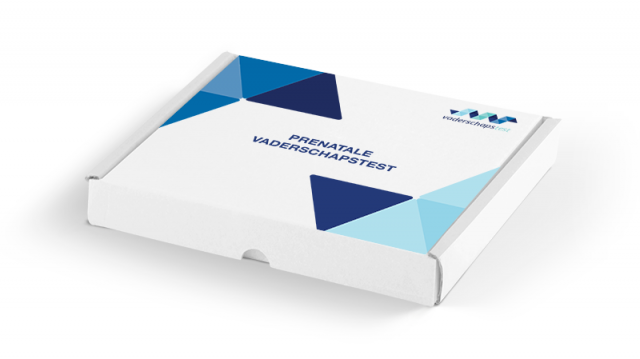Prenatal Paternity Test
Test without risk and before birth who the father of your unborn child is. The test is performed using the mother’s blood and the father’s cheek mucus.
- Completely safe for the baby
- More than 99.9% accurate
- From the 9th week of pregnancy
- Within 8 days of receiving the result back
- ISO 17025 recognized


Why a prenatal paternity test?
With a prenatal paternity test you can already have a DNA test performed during pregnancy. This way you can check whether the alleged father is really the biological father of the unborn child. The prenatal paternity test from paternitytest.nu is performed with the mother’s blood. No DNA is taken from the baby and the test therefore poses no risk to the baby. This is different with chorionic villus sampling or amniocentesis. The mucous membrane is removed from the alleged father with a cotton swab.
The prenatal paternity test can be performed from the 9th week of pregnancy until just before delivery.
Perform Prenatal Paternity Test
If you order a prenatal paternity test from us, we will send you the necessary items in neutral packaging. In this package you will also find the instructions for taking the DNA properly. The alleged father can take his cheek mucus himself (with a peace-of-mind test), the mother’s blood must be taken by a GP, midwife or at an injection station. As soon as this is done, our courier service will collect the package and transport it to the laboratory. You will receive the result within 4 working days (in the case of an urgent test) or within 8 working days from us.
How does it work?
If you order a prenatal paternity test, you will receive a package with a test kit from us. Your privacy is our top priority, so the test kit always comes in neutral packaging.
Order test
You order the test online, after which the test kit is often delivered the next day in a neutral envelope.
Pick up and send
You simply and painlessly take the DNA samples with cotton swabs and send them to us.
Analyzing DNA samples
Your DNA samples will be analyzed and tested in one of our labs within 4 working days.
Receive result
You will receive the test result by post or e-mail within 4 working days. Fast, simple and very reliable!
Frequently Asked Questions
When can I have a prenatal pregnancy test?
A prenatal pregnancy test is already possible from the 9th week of pregnancy, until just before delivery. We calculate the number of weeks of pregnancy in the same way as obstetricians, gynaecologists and general practitioners. So we count from the first day of the last menstruation.
What are the risks for my baby?
With the prenatal paternity test from paternity test.nu there are no risks for your baby. There is no chance of complications during your pregnancy and there is no increased chance of miscarriage. We extract the DNA of the baby from the mother’s blood, and therefore do not come close to the baby or the amniotic sac.
Why is blood taken from the mother in a prenatal paternity test?
During pregnancy, the baby’s DNA ends up in the mother’s blood. This goes through the placenta. In a non-invasive prenatal paternity test, such as that of paternity test.nu, blood is therefore taken from the mother, and cheek mucus from the alleged father. In the laboratory, the unborn baby’s DNA is taken from the mother’s blood and compared with the DNA of the alleged father. In this way there is no risk of complications during pregnancy.
What is a non-invasive prenatal paternity test?
This is a prenatal paternity test, in which the DNA material of the unborn child is collected without going near the baby or the amniotic sac. As a result, the unborn baby does not run any risk and there is no chance of complications during pregnancy. In a non-invasive prenatal paternity test, blood is taken from the mother and cheek mucus is taken from the father. In the lab, the unborn baby’s DNA is isolated from the mother’s blood and compared with the DNA from the alleged father’s cheek mucus.
What is the difference between a non-invasive and an invasive prenatal paternity test?
An invasive paternity test, such as chorionic villus sampling or amniocentesis, increases the risk of complications during pregnancy. There is also about a 2% chance of miscarriage. For these tests, the mother must have a biopsy or puncture performed in the hospital. In contrast to a non-invasive paternity test, this involves penetration into the body. Incidentally, such an invasive test can only be performed much later (week 11-15 or week 16-22 of pregnancy depending on the method used).
The reliability of invasive and non-invasive paternity testing is equally high.
What is the reliability of the prenatal paternity test?
We only work with the most reputable, modern and certified laboratories. So you don’t have to worry about that. Our prenatal paternity test always gives you at least 99.9% certainty whether the alleged father is the biological father. If the tested man is not the biological father of the unborn child, the laboratory always determines this with 100% certainty.
I need the results urgently, is that possible?
Yes, we can speed up the process for an additional fee. You will then receive the result within 4 working days, instead of within 8 working days. Choose the ‘urgent test’ option for a quick result during the ordering process.
Can the results of a prenatal paternity test be used for lawsuits?
You can have us perform a legally valid prenatal paternity test. Although the result of a regular peace of mind test is just as reliable as the result of a legally valid paternity test, we are not aware of any cases where the result of a peace of mind test has been accepted in legal proceedings.
Does a previous pregnancy affect the result of a prenatal paternity test?
New. Once a baby is born, his or her DNA disappears from the mother’s bloodstream within hours. Previous pregnancies therefore have no influence on the result of a prenatal pregnancy test.
Why is a prenatal paternity test so expensive?
The amount of DNA in the mother’s blood is usually very low. In order to isolate this DNA, specialized researchers and the most modern techniques are needed. As a result, the costs of a prenatal paternity test are higher than other DNA tests.
Can you also see the gender of the baby?
Yes, we can also determine the gender for an additional fee. If you want to know the gender, choose the option ‘sex determination’ during the ordering process. We cannot test other genetic data.
Have a question?

